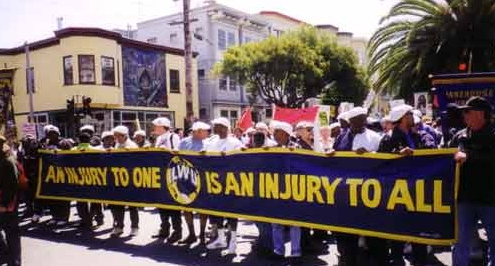Mumia Abu-Jamal and the Labor Movement
Click here for a PDF version of this article
April 24, 1999: Longshore and warehouse workers in the International Longshore and Warehouse Union (ILWU) prepare to lead a march for Mumia’s freedom through the streets of San Francisco. All the ports on the West Coast were shut down tight for one shift that day to demand: “Stop the Execution!” and “Free Mumia Abu-Jamal!” Heading up the march of 20,000, the 300-strong longshore contingent chanted, “An injury to one is an injury to all! Free Mumia Abu-Jamal!”
Death-row journalist and activist Mumia Abu-Jamal is the world’s best-known political prisoner. But more than that, he has been “the voice of the voiceless,” waging a relentless struggle against racism and injustice, imperialism and war, and speaking out on a host of other social issues. This struggle, and these issues, go to the heart of the struggles and aims of working people all over the world. So, it should come as no surprise that he has both extended concrete solidarity to working people, and been the recipient of the same powerful solidarity from racially integrated organized workers around the world.
Despite a threat of state execution hanging over him for a crime he did not commit, Mumia Abu-Jamal has from the beginning fought to expose for others the hypocrisy of the powerful, and the futility of relying on the capitalist state. In the first of his now-famous commentaries from death row, written only a few months after the shooting for which he was being framed, and as he awaited his trial, he wrote, “Nowhere have I read an account of how I got shot, how a bullet happened to find its way near my spine, shattering a rib, splitting a kidney, and nearly destroying my diaphragm. And people wonder why I have no trust in a ‘fair trial’!” Mumia goes on to affirm that justice will not be found through “the Philadelphia Police Department, the District Attorney’s office, the court system, or your friendly neighborhood lawyer…” (A Christmas Cage, February 1982).
The Formation of the Labor Action Committee To Free Mumia Abu-Jamal
The Labor Action Committee To Free Mumia Abu-Jamal (LAC) was organized in late 1998-early 1999 in the same spirit of distrust of the ruling class and its so-called “justice” system. Rather than relying on an illusory “new trial” to free Mumia, we proposed mobilizing the great strength of the organized working class.
On these pages you will find several examples of concrete labor-solidarity actions, both by Mumia in support of workers’ actions and striking unions, and in support of Mumia’s freedom, conducted by unions and activists. Links to some of the more salient documents pertaining to these actions and struggles will be found below. These actions point the way to international labor defense–the only strategy with the power to truly uproot the kind of injustice meted out to Mumia Abu-Jamal and so many other victims of the racist capitalist system.
The Neptune Jade–a victory for international labor solidarity
In 1998, Mumia Abu-Jamal headed the list of endorsers of the Neptune Jade defendants, a group of community activists and unionists who were being sued by the Pacific Maritime Association (PMA–shipping conglomerates) for their part in a successful picket of the ship Neptune Jade in defense of locked-out British dockers. Three years earlier, dockworkers in Liverpool, England had begun a years-long struggle against a lockout by waterfront employers, which was part of a general assault on organized labor under the Conservative Thatcher government. The cargo ship Neptune Jade, which had been handled by union-busting Mersey Docks and Harbour Company in Britain, was unable to unload in the Port of Oakland as longshore workers in the International Longshore and Warehouse Union (ILWU) honored the picket line. The Neptune Jade was subsequently boycotted by dockers in Vancouver Canada, and Yokohama and Kobe, Japan as well. Global shipping magnates shook at the specter of international labor solidarity that this action raised.
Faced down by a strong defense campaign, the PMA was soon forced to drop its suit against all defendants. The successful Neptune Jade action was a major inspiration for the formation of the Labor Action Committee To Free Mumia Abu- Jamal (LAC).
Mumia Honors a Virtual Picket Line
Despite the importance of publicity in his defense campaign, Mumia Abu- Jamal honored a virtual picket line in 1998 by refusing to be interviewed by Sam Donaldson of ABC-TV for a “20/20” documentary on his case, during a lockout of technicians and camera operators in NABET-CWA. “I had to ask myself,” said Mumia, “‘Would I cross a picket line if I were living in quasi-freedom and walking to the studio?’ The answer was an irrevocable, ‘no.’” (“A View From Death Row,” Mumia Abu-Jamal, interviewed by Jack Heyman of ILWU Local 10, in The Dispatcher, February 1999. Read the Complete Interview.
The LAC was organized to promote bold actions similar to the Neptune Jade boycott–and to Mumia’s own honoring of picket lines–to free Mumia. We realized that the organized working class has the power to achieve victory, while reliance on the bosses’ courts was sure path to defeat. Our founding statement to this effect was adopted in January, 1999. Read it here.

